Transparent Samobor Provides Automated Display of Payments, Contracts
July the 27th, 2021 - Transparency isn't something the Croatian authorities are all that used to. With corruption apparently being tackled with a wave of new mayors and local government units doing things differently, one continental Croatian town is going a step further. Meet transparent Samobor.
As Poslovni Dnevnik/Lucija Spiljak writes, in July, Samobor became the only city in all of Croatia to boast an automated display of all of the payments, invoices, contracts and purchase orders made by Samobor's administration in one place, thanks to the digital service iTransparency made by the Zagreb IT and consulting company Libusoft Cicom.
This digital service enables the creation of a transparent Samobor, the publication of timely, accessible, accurate and credible information on the implementation of budget items, which, among other things, prevents irresponsible actions and misuse of public funds, while local government units are encouraged to publish and explain their own budget documentation.
At the same time, the general level of information available to people, the media, entrepreneurs and even investors about local strategies and actions and their results has been raised, and it's all available in just a few clicks on the following website: https://transparentno.samobor.otvorenigrad.hr/isplate.
The director of the company responsible for the development of the newly transparent Samobor's service, Marko Ignjatovic, explained just how the system works and what it means for this city.
“Samobor is currently being provided with insight into payments made out to both individuals and legal entities, as well as incoming invoices, contracts and purchase orders, which will provide people with an accurate insight into all operations. On top of that, further improvements in functionality are being made to make new search and filtering capabilities available; according to time and the desired classification.
The possibility of corruption is definitely now reduced to a minimum and from our experience so far, we can say that the first results are visible very quickly. Unlike some competing solutions, our iTransparency system simply connects to other systems, and all of the data comes in automatically. In this way, additional costs and the possibility of mistakes are avoided, and business itself is facilitated,'' stated Ignjatovic.
The value of the project ranges from 20 to 30,000 kuna. and the company's team gradually developed and upgraded it over the years, while the introduction of the system in Samobor was worked on intensively for two weeks.
The iTransparency service is just one of the nine functionalities of the company within the LC Platform Open that can be implemented in the business of counties, cities and municipalities.
"So far, about 20 cities and about 10 municipalities have joined the project, and some more are currently in the process of being introduced. Digitisation and transparency are no longer a matter of choice but a legal obligation. As a direct consequence of the introduction of digitalisation and transparency, JLP (R) S is becoming more open to people, it's becoming easier and faster to communicate digitally, we can facilitate business insight, and it allows for more efficient budget management and the optimisation of investments,'' said the director.
Most of their team, out of a total of 140 experts, are based in Zagreb, but in order to be more easily accessible to many users, some are located in four business centres in Dalmatia, Primorje, Istria and even further east in Slavonia.
So far, they have achieved successful cooperation with more than 1,200 users, which include budget users, utility companies, residential building managers, companies and non-profit organisations, meaning that the newly transparent Samobor is one client in a long line for this successful Croatian enterprise.
“Thanks to 29 years of experience and numerous references, we've become leaders in the segment of software solutions intended for local and regional self-government units. We're proud to be able to stand out in the field of customer support, consulting services, online education and consulting, system and technical support, design and implementation, etc. Thanks to this transformation of business and comprehensive service, in addition to being an IT company here on the Croatian market, we've also profiled ourselves as a successful consulting company,'' stated Ignjatovic.
For more, follow our politics section.
Transparency, the Biggest Winner in the 2021 Croatian Local Elections?
May 27, 2021 - The first round of the 2021 Croatian local elections brought a strong breeze of change to the country, with one clear winner - transparency.
I must confess that I am looking forward to Monday morning. Apart from the fact that I will be back in court for the first hearing of one of my two lawsuits from the Croatian National Tourist Board (which I am secretly quite enjoying, but don't tell anyone), it will also be the day after the second round of voting in the Croatian local elections.
The Croatian obsession of treating even minor politician as rock stars is a source of endless fascination to me. Ask the average Brit to name, reconise and know the position of 10 politicians, and you will struggle. Not so in Croatia. Even though we do not talk politics at home, my daughters knew the mayors of Jelsa, Split and Zagreb, Karamarko, Oreskovic, Kosor, Plenkovic, Milanovic, Sanader and probably a few others. While at kindergarten age.
The negativity of campaigning is on the rise globally, but things are always fairly murky in the Balkans.But are things changing a little? Is there some hope for Hrvatska, as that gentle Croatia 2.0 breeze of change gathers strength? If, as expected, the frontrunners for Sunday's run-off in Split and Zagreb prevail, this will be a huge gust of wind blowing in the direction of a better future for our children.
But it is not just in the big cities.
I have been meaning to write this post for a while, but TC and Dubrovnik nomads have kept me busy. After the first round of elections on May 16, I posted this on my Facebook profile:
Although I don't pretend to understand all the nuances of Croatian local politics, a very interesting night at the polls. A brighter dawn for Zagreb for sure, and the success of young Ivica Puljak in Split is truly inspiring.
Can change come to Croatia? Look no further than Sveta Nedelja and compare the vote to 4 years ago. Even without Rimac, Holy Sunday is flying. Thanks to the leadership of Dario Zurovec and his team, jobs are up 20%, population has increased by 10% it has been named the top medium-sized Croatian town for the economy for the last 3 years in a row, as well as in the top 5 for quality of life.
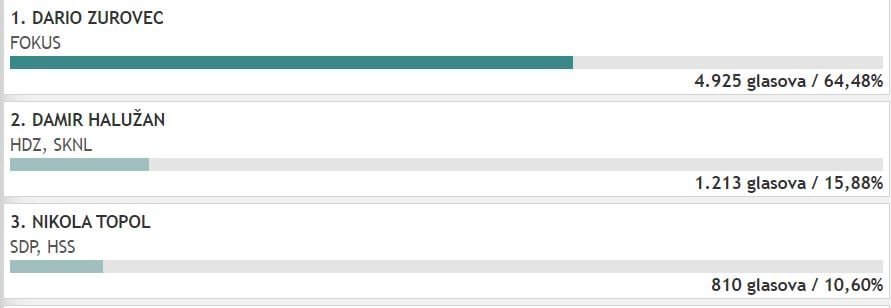
And the voters seem to like it. A staggering 42% increase in the vote for young Zurovec, from 22% in 2017 to 64% this time around. A tiny case study of how to bring change to Croatia in just 4 years.
Just as the Croatian National Tourist Board is an irrelevant institution, so too the old politics of corruption and cronyism. I must admit. I am loving this gentle breeze of change, which is slowly gathering pace by the day. Go Croatia 2.0!
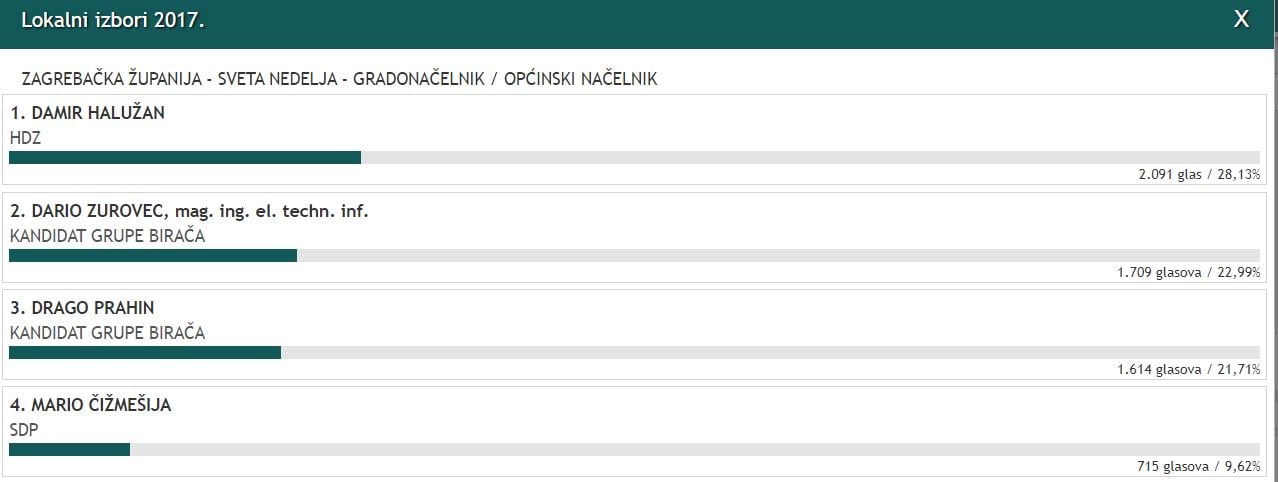
It seems that Sveta Nedelja was not alone. Transparency legend and Croatian brainbox Vuk Vukovic has been working with various local authorities to introduce transparency into local administration. And he had a rather interesting Facebook update of his own:
Transparency pays off ?
In the cities and municipalities that have introduced (or are introducing) our version of full budget transparency, their (city) mayors are each at over 60% in the first round.
Hrebak, Bjelovar - 66.8%
Ahmetovic, Omisalj - 63.5%
Petrina, Primosten - 70.3%
Bilic, Trogir - 63.6%
Ok, they would all get it probably without transparency, there are a lot of other projects and merits, but if it helped them a little, it's good!
Congratulations to the cities that have a transparent public procurement register (which is also certainly a step in the right direction), such as Sveta Nedelja and Zlatar, and their mayors at over 60% in the first round. Again, thanks to great other projects, but it's nice that voters honor this topic as well.
And I am also glad that the candidates in other cities who announced transparency were awarded, and those who faked transparency, ie offered a false promise, were punished (such as Pavičić-Vukičević and Filipović in Zagreb).
Everything is great.
There must be a message in there somewhere. Could it be that when people decide to vote for a better future for their children rather than the nepotism of the past, they see that Croatia moves forward, and their lives are better as a result? And then they want more of it?
Looking forward to a cleansing bura on Sunday night and then focusing on fresh beginnings on Monday. The twin viruses of technology and transparency are here to stay.
Croatian Exporters Say National Recovery Plan Needs Transparent Project Criteria
ZAGREB, 14 April, 2021 - The National Recovery and Resilience Plan calls for extremely transparent criteria for selecting projects and contractors, as well as defining criteria which will protect the domestic economy, the Croatian Exporters Association said on Wednesday.
One of the priorities is for hundreds of thousands of young expats to return to Croatia, the association underscored.
Croatian Exporters said that they welcomed the 2021-2026 draft national plan, aimed at strengthening economic and social resilience of the Croatia economy, that is, "mitigating the social and economic impacts of the crisis and contributing to the green and digital transition", because many of the recommendations and requests they had been sending to the government in recent years had been partially taken into account.
However, they warn that there are some questions and doubts about the planned allocation of funds for the national plan's components, 54% of which should be earmarked for the economy.
"Have key performance indicators been defined, analyses conducted and effects of planned projects on long-term sustainable and harmonised growth and development of Croatia quantified? (...) Planned investments covered by the National Plan will certainly increased Croatia's GDP in the next six to eight years, but we doubt whether it will increase the long-term GDP growth rate," Croatian Exporters said in the review they sent to the government.
They are also under the impression that the domestic production and export processing industry has been neglected in the national plan.
"Digitalisation and the green economy... won't be sufficient drivers for a big step forward in the development and progress of the domestic industry. At the same time... projects aimed at infrastructure, energy, construction and tourism won't contribute to a significant improvement in the poor structure of the Croatian economy," the exporters' association said.
They also consider that it is necessary to define criteria that will protect the domestic economy.
For more about politics in Croatia, follow TCN's dedicated page.
City of Trogir Third in Croatia to Introduce Full Budget Transparency
February 9, 2021 – By introducing an interactive mobile application for full budget transparency, the City of Trogir will soon join the Croatian cities of Split and Bjelovar and the municipality of Omišalj and become one of the most transparent local governments in Croatia.
Together with the Science and Society Synergy Institute, the City of Trogir signed an agreement to introduce the city budget's full transparency. The contract represents the first phase of a project to create a simple and visually attractive application that would give citizens a different budget view.
With the application, citizens would have an insight into ongoing or planned projects, the performance of previous budgets and the budget for next year, or the supplementary budget for the current year. The application would provide an overview of the current budget. At the same time, additional options will compare the plan with the performance and a comparison with previous years' budgets.
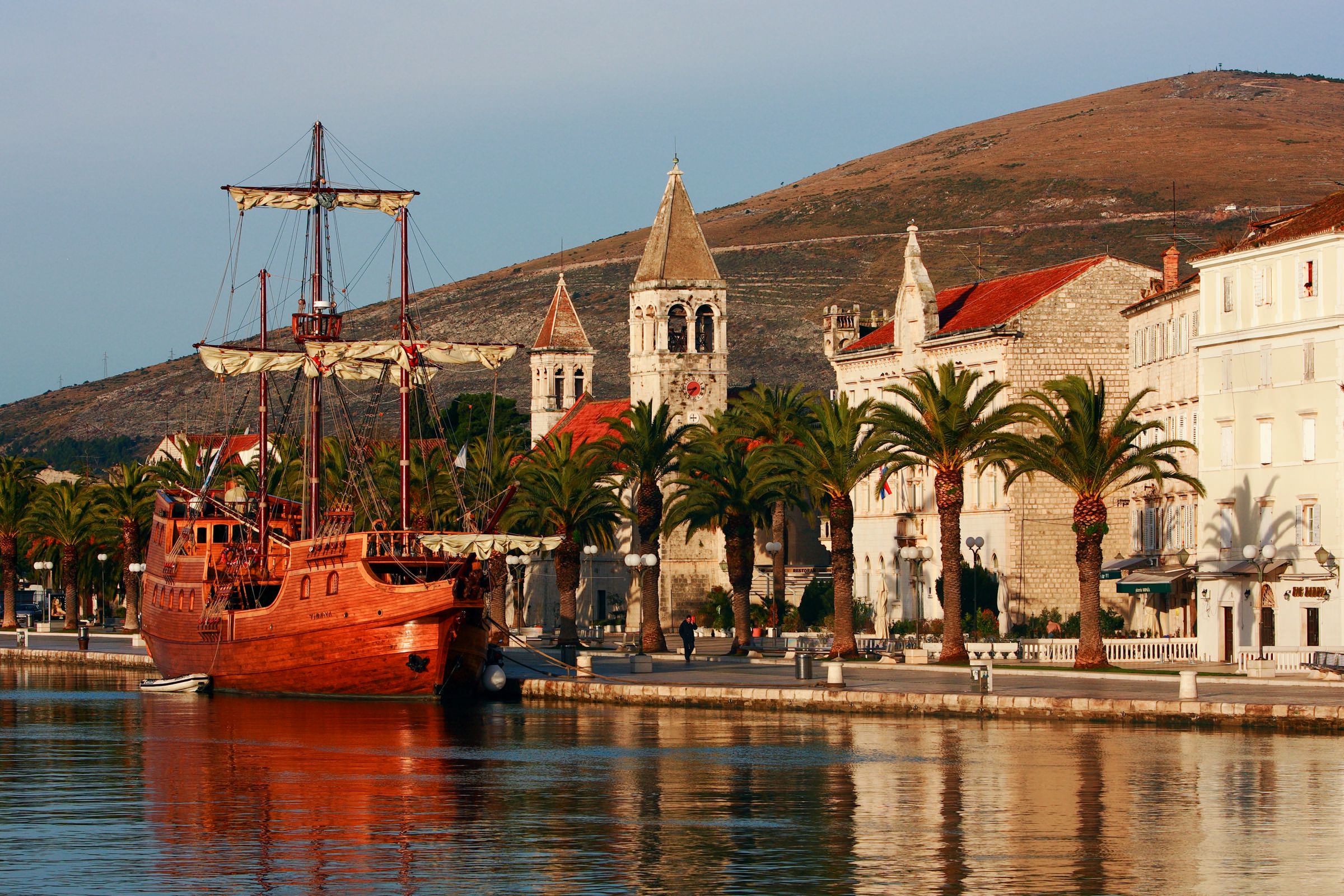
Trogir / Photo: Romulić and Stojčić
Trogir to become the most desirable small town on the coast
The City of Trogir wants to bring concrete budget items closer to the citizens through clear and simple numerical indicators and through aggregate indicators that are difficult to understand. They want to educate and sensitize citizens for certain types of strategically important projects. In other words, citizens would get an insight into what exactly their money is spent on.
"Through this project, we continue to introduce smart practices. The goal is to show how city money is managed and involve citizens in the City Administration's work as much as possible. So far, we have done this through participatory budgeting, 'And you are asked!', a project through which citizens themselves directly decide on spending part of the budget money. Last year, the Institute of Public Finance gave us grade five for transparency for the first time. We have also published an online register of city property, and with this application, we are going a step further," said Mayor of Trogir Ante Bilić.
The average assessment of Croatian cities' transparency for 2020 is 4.5, compared to the previous 2019 when it was 4.3. In 2019, Trogir received a grade of 4, and in 2020, thanks to the publication of all five city documents required for insight into transparency, a rate of 5. The number of Croatian cities of excellence increased from 65 in 2019 to as many as 87 in 2020, a positive trend.
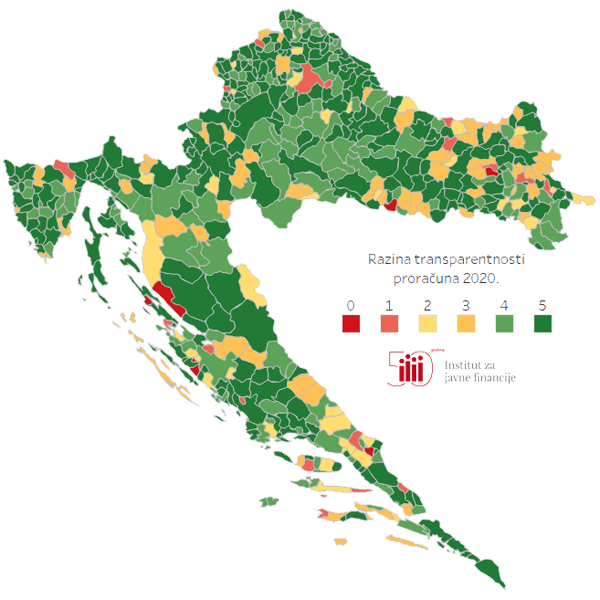
Budget transparency of Croatian cities and municipalities / Institute of Public Finance
"Budget transparency is our obligation and one part of the smart city strategy we will develop this year. This is a necessary level of development planning by which we want to make Trogir the most desirable small town on the coast in every sense. Precisely such projects by which we raise democratic standards are a guarantee that we will never end up in the problems we were in three years ago," said Bilić.
Striving for complete city transparency
This interactive visualization of the budget will be available to citizens in two months. It will be implemented by the Science and Society Synergy Institute based in Čakovec, headed by Vuk Vuković.
"The application we will create for Trogir offers an in-depth and visually attractive presentation of all revenues and expenditures up to the fourth level of the budget, according to the functional and economic classification. This data, the functional classification up to the fourth level of spending, has not been given to city councilors at budget hearings who receive budget expenditures up to a maximum of the third level. For example, the fourth level means that you can enter within each city's budget user – kindergartens, schools, museums, libraries – and see who spent how much on salaries, maintenance, what they bought, etc. The third level gives only the total amount received by which user, without going into details. With this presentation, citizens have a more detailed insight into city spending than city politicians," Vuković explained.
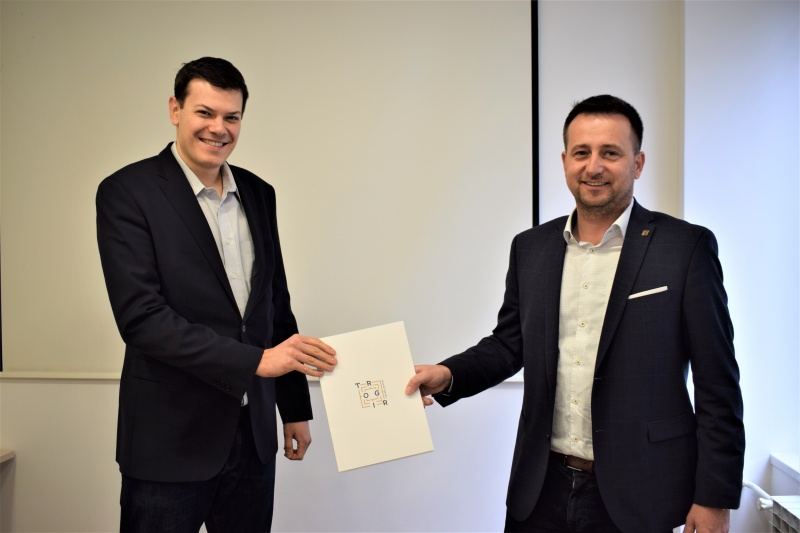
Ante Bilić and Vuk Vuković / Photo: Trogir.hr
Following an interactive budget guide, the next step will be a detailed overview of all budget accounts. Citizens would have an insight into each transaction from the budget, from public procurement to entertainment expenses. Then there will be complete transparency of the city towards users.
Bjelovar was the first to introduce transparency application
Thus, Trogir will be one of only three cities in Croatia and Southeast Europe with a completely transparent budget. A similar practice has been introduced by the Croatian cities of Bjelovar and Split and the municipality of Omišalj, which also introduced applications for insight into the city budget. The City of Bjelovar presented a similar application in February 2019. Vuković also helped them, making them the first most transparent city in Croatia, for which they were awarded that year.
"Bjelovar has thus embarked on a unique undertaking in Croatia and this part of Europe, which is to raise transparency to a level that has not been introduced in any public authority so far, to raise the quality of the City Administration's work and strengthen public confidence," said Vuković at the time, as reported from Bjelovar.
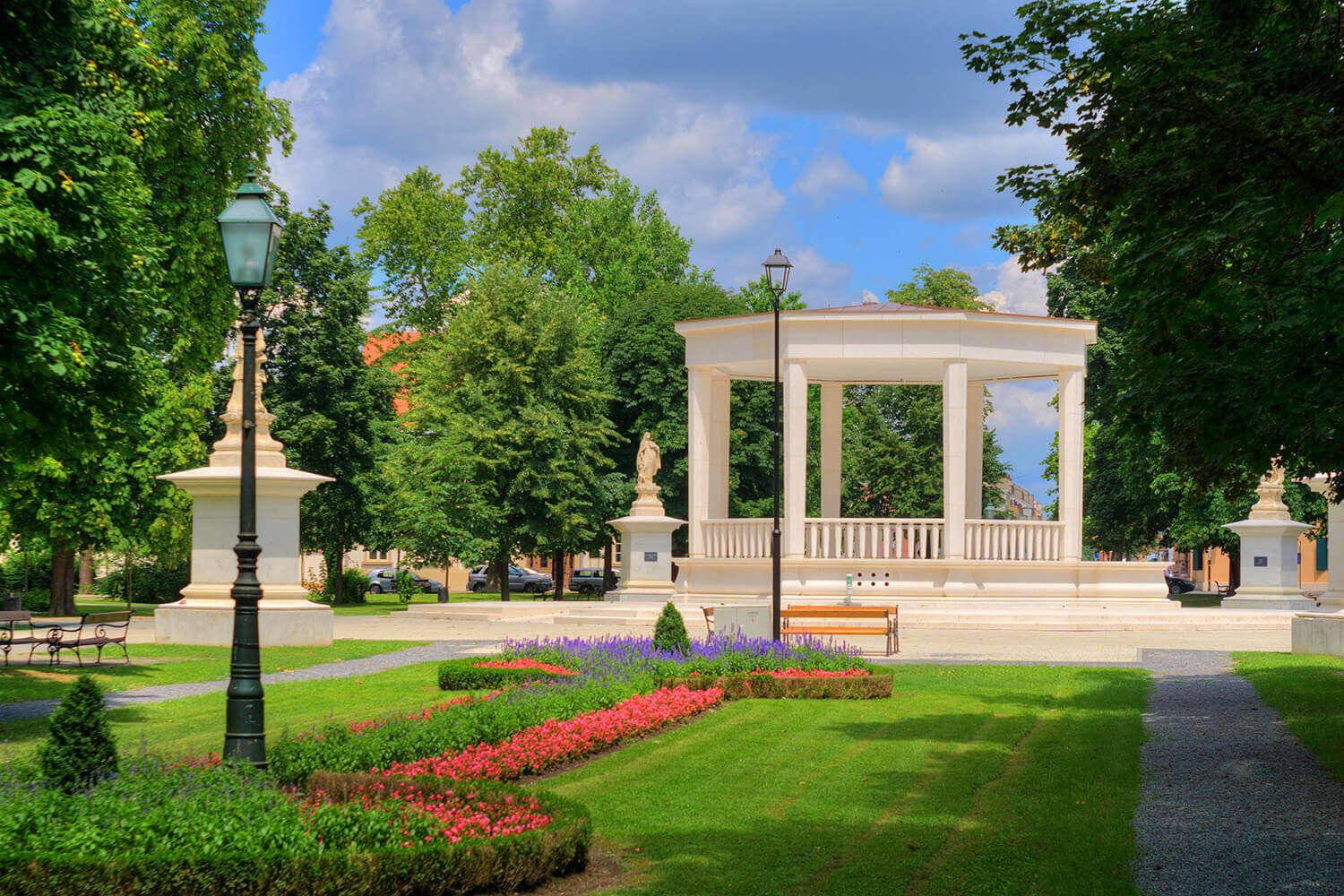
Bjelovar Pavilion / Photo: Bjelovar.hr
Bjelovar's positive example was followed by the municipality of Omišalj, which introduced the transparency application at the end of March 2020. The largest Croatian city on the coast – Split – also decided to do so, and neighboring Trogir took over its practice.
Namely, the citizens' right to access information held by public authorities is guaranteed by the Republic of Croatia's Constitution. Therefore, in addition to the moral, the public authority also has a legal duty to provide information on public money spending. However, while in developed democracies such transparency is considered the standard and, for example, all individual transactions from the US federal budget of 1.5 billion dollars are available to the public through an interactive Internet search engine, in Croatia it has never existed before, nor are public authorities considered this possibility.
This trend seems to be changing in Croatia. The transparency of Croatian cities is presented in an interactive map of the Institute of Public Finance.
To read more about lifestyle in Croatia, follow TCN's dedicated page.
Transparent Bjelovar Gives Rest of Croatia Food For Thought
A modern and transparent Bjelovar is a shining example for the rest of Croatia. From lowering surtax to making the city administration actually work for the residents, what this continental Croatian city has done should be looked upon as a drawing board for the entire country - which is lagging behind severely.
As Vecernji list/Poslovni Dnevnik/Lucija Spiljak writes on the 3rd of March, 2020, the now transparent Bjelovar has reduced surtax, the city government is fast, efficient and more clear, has nothing to hide, and wants citizens to know what they are paying into the city budget, why, and exactly where it's going.
Bjelovar is the most transparent city in all of Croatia, which has shown the entire country how to accelerate the development of entrepreneurship and increase employment, with a free application through which all citizens have access to payments from the budget of the City of Bjelovar. This was precisely the reason for the conference entitled How Transparency Affects Entrepreneurship which was held by the City of Bjelovar in cooperation with Vecernji list and Poslovni Dnevnik at the Bjelovar Cultural and Multimedia Centre.
On this occasion, Vladimir Nisevic, Editor-in-Chief of Poslovni Dnevnik, said that there is a link between transparency and the economy and that it needs to be nurtured.
"Businessmen and citizens want to know how public money is being spent, and that should be the rule in Croatia. Therefore, us at Poslovni Dnevnik and Vecernji list want to change society and send clear and important messages about the inevitable connection between the economy and transparency,'' said Nisevic during his opening speech.
The Mayor of the City of Bjelovar, Dario Hrebak, emphasised that they were no longer the only transparent local self-government united in Croatia, but that the municipalities of Omisalj and the City of Sveta Nedelja had also joined them on that highly commendable list.
He also recalled the term ABC, which means ''Anything but Croatia'', referring to the numerous foreign investors who were bypassing Croatia due to the dreadful bureaucracy, excessive taxes and corruption.
"If we send a strong message to citizens who have the right to know how politicians spend their money, then we're sending out a strong message that in Bjelovar, the kuna is worth more than any other kuna invested in Croatia. The emphasis is placed on transparent behaviour and the fight against corruption. We've reduced surtax, the city government is fast, efficient and more clear, we've got nothing to hide and we want our citizens to know what they are paying into the city budget for,'' stated Hrebak when discussing the commendable transparent Bjelovar, before continuing:
''Therefore, we'd like to invite investors to come and invest in the City of Bjelovar, because theirs, that is, your kuna, is worth more here than it is anywhere else in Croatia,'' Hrebak said, adding that the modern economy cannot exist on the basis of the bureaucratic model of the last century.
Then, Helena Schmidt, a partner in Deloitte's tax advisory department, presented the current state, challenges and prospects for the future of local and state tax levies.
In a one-on-one interview, Vladimir Nisevic and Davor Huic, president of the Lipa Taxpayers Association (Udruga Lipa), discussed ways to spend public money and implement structural reforms for an efficient system that actually works in the service of citizens.
Huic explained that since he had decided to engage in public activities back in 2014, when the Lipa Association initially started its operations, he himself decided to comment on policies and make his view public, especially after he added that three governments had reacted incorrectly to the economic crisis which for Croatia meant the loss of 150,000 workers and then a demographic crisis.
''During the time of Tim Oreskovic's government, which didn't address ideological issues, I was an advisor and the focus was on fiscal consolidation, the economy and stimulating economic growth. The current Croatian government is lucky and Plenkovic and Maric are doing good things, but that isn't enough. It's no longer just about taxes but also about the quality of service.
Well, in Zagreb, where the surtax stands at 18 percent, schools don't have soap. That's the whole picture of the Croatian public sector because it takes a lot, but it gives very little,'' Huic said, adding that people who exercise positions of public authority have an obligation to citizens to be accountable and responsible.
He also believes that Croatia is facing a lack of democracy and democratic awareness.
''We insist on lower taxes so that we're left with more money for other things, we want to change and specify the relationship between taxpayers and the authorities. Cities have introduced transparency, started cutting taxes and this is an indication that the climate is changing. They've recognised the citizens' need for a transparent policy. Political elites can't just dispose of public money as they wish, but they should spend it effectively and for the public good, which isn't the situation at the moment,'' he warned.
He also used the opportunity provided by the now transparent Bjelovar to touch on the often needlessly confusing topic of health insurance in Croatia, which he says is universal and that actually few people pay in, but nobody controls or rationalises the costs.
"There should be service prices to integrate the public and private parts, including vouchers. Regarding pension insurance, regulation is needed because there are various legal ways to ''get'' a pension, and of the 1,200,000 pensioners, a large proportion haven't worked full-time,'' he warned.
He thinks there are two approaches: to wait for people with a mindset like himself and transparent Bjelovar's Mayor Dario Hrebak, or for local government units to digitise the public administration, such as, he said, in Sveta Nedelja. where it's possible to evaluate people's work in the public sector.
''The Government of the Republic of Croatia has no right to adopt measures that slow down Croatian growth and therefore it makes no sense to adopt measures that reduce our competitiveness. The Lipa Association will demand from all political parties and impose that the central government make the state budget transparent and that the local self-government units introduce a measure on the example of Bjelovar,'' concluded Davor Huic.
After the interview, Deputy Mayor of the City of Bjelovar Igor Brajdic gave a presentation on the development of the economy in the now transparent Bjelovar, referring to the general measures for stimulating entrepreneurship, both realised and planned projects, and the connection between an open budget and transparent spending with the general progress of the economy.
Make sure to follow our dedicated politics page for more on transparent Bjelovar.
Transparent Croatia: Sveta Nedelja to Pay Officials Based on Citizen Evaluation
With Bjelovar getting the ball well and truly rolling, a transparent Croatia could be closer than ever. A former pipe dream in a country with numerous essential systems mired in corruption, a transparent Croatia could give residents what they need to stay in Croatia.
As Index/Marko Repecki writes on the 21st of February, 2020, Sveta Nedelja is set to introduce a fixed and variable part of its salary paid to its officials and civil servants, which will depend on the evaluation they get from citizens. This revolutionary move was announced on Mayor Dario Zurovec's Facebook profile, marking another step forward into a more transparent Croatia.
Sveta Nedelja near Zagreb is known for its enticing tax reliefs, but also for many successful businesses operating in its area. The most famous is probably Rimac Automobili, owned by beloved Croatian entrepreneur, Mate Rimac.
In addition to grading officials and civil servants and the new wage system, this town near Zagreb will also introduce a new level of transparency, meaning that citizens will have access to all the bills and invoices the city pays and the contracts it concludes.
This is a decision not many local sheriffs will like...
Many local sheriffs are far from pleased to see these kinds of ideas because they fear that their fellow citizens may also ask for something similar, but this practice is slowly spreading as a more transparent Croatia gradually begins to emerge. The younger generation of local leaders, however, understands that they are in their jobs because of the citizens, and the citizens aren't there just because of them. Bjelovar, which has been written about frequently of late, also has systems for monitoring accounts after Mayor Dario Hrebak introduced it. The Municipality of Omisalj also boasts such a system, as Mirela Ahmetovic introduced a cost transparency system.
''We're the first in Croatia to introduce employee appraisal by citizens and pay and reward them according to those appraisals, thus introducing a fixed and a variable part of their income. Specifically, today we have introduced an application through which citizens will be able to evaluate employees after using a service within city administration. Furthermore, city government employees will also be able to evaluate each other, and the result of this process will be a ranking of employees by grade. In the second step, we'll propose to the city council a 10 percent pay cut for all employees,'' Zurovec wrote on Facebook upon announcing the move.
The ability for citizens to evaluate officials and civil servants begins on March the 1st, 2020
"We will then pay them rewards each quarter as follows:
• 5 percent of the worst rated will not receive a reward (they will receive 10 percent less of their current income)
• The next 20 percent will receive a reward of half of the amount that has been deducted (they will receive a bonus of 5 percent lower than their previous salary)
• The middle 50 percent of those assessed will receive a reward in the same amount as their salary (ie, their salary + reward will be equal to their previous salary)
• The next 20 percent of those assessed will receive a reward in excess of the salary reduction (their salary + reward will be 5 percent higher than their previous salary)
• The top rated 5 percent will receive a reward of double the salary reduction (salary + reward will be 10 percent higher than their previous salary)
The ability for citizens to evaluate employees starts from March the 1st, 2020. If the City Council decides to formally adopt the decision, and I believe it will, it will be reflected in wages for the first time on July the 1st, 2020. The evaluations will be done in such a way that when using a city administration service, the citizen will receive a four-digit code from the employee, which he will enter into the application so that he can access the grading of that employee,'' Zurovec's statement reads.
The publication of all invoices/bills and purchase orders will further encourage a transparent Croatia.
"We're the first in Croatia to make all of our contracts, purchase orders and invoices/bills public in order for people to see the documents to which the invoices are linked. Here, we'll show all documents, even those below 20,000 kuna, which is not obligatory under the public procurement law. The only exception is, if we have such cases, contracts or invoices related to social welfare. In Croatia, we introduced real-time electromagnetic radiation measurements with the online publication of these documents in collaboration with the Koncar Institute to give our citizens an insight into the real levels of radiation, a level of transparency in all areas not ever seen before in Croatia.
After introducting the biggest local tax reliefs, Sveta Nedelja is once again raising the bar for the entire country, this time in the field of transparency, it is also raising the level of efficiency of the public sector, and we're proving that it can be better! Finally, I'd like to ask for understanding if the application experiences some difficulties at the beginning of its function, and we're open to suggestions for further improvements,'' Dario Zurovec's Facebook profile reads.
Make sure to follow our dedicated politics page for more information on a more transparent Croatia.


